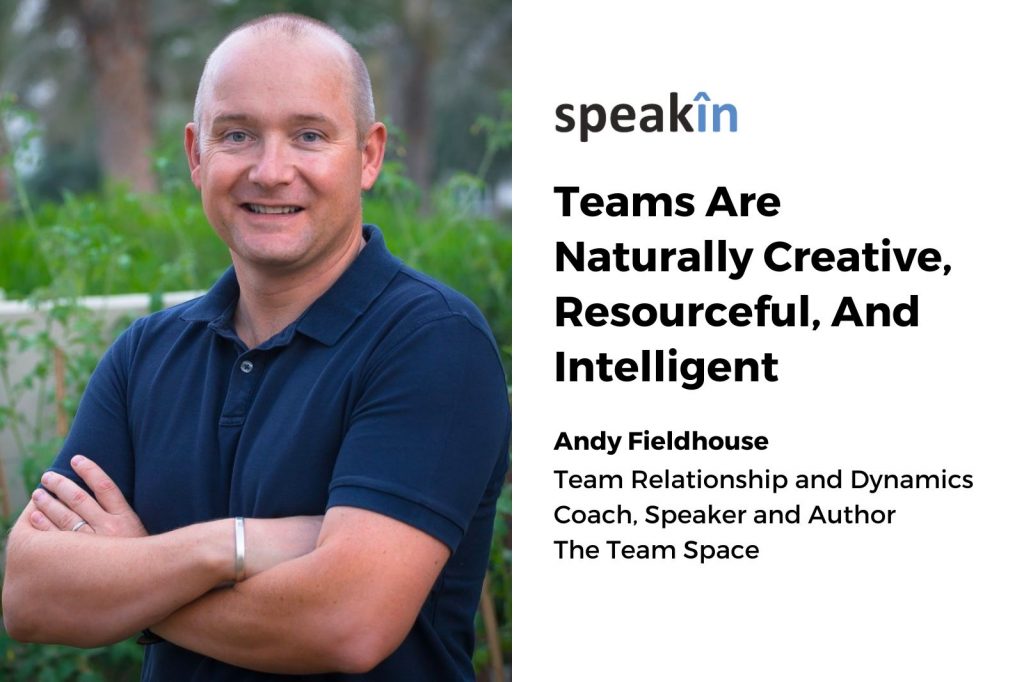Teams Are Naturally Creative, Resourceful, And Intelligent

An interview with Andy Fieldhouse, the Dubai-based team relationship and dynamics coach, speaker and author. “I train and coach teams so that they can create a cohesive, connected culture based upon meaningful purpose, deep trust and supportive relationships,” he says.
How did you get into this field of teams and teamwork? Tell us more about it?
I didn’t set out to be a team coach; it happened gradually over time. I moved to Dubai in 2008 and was lucky with the job to get into team-building events and activities. It was more about getting a job—any job, rather than a specific job and I think universe really answered that well. These team-building events that led me to wonder why some teams perform in a certain way, and some others differently. That led me to research, read and eventually train and certify as a coach of teams. I do believe in the power of a coaching-based approach.
What are the most important things a team leader needs to think about while donning the mantle of a leader?
That we are all human beings, and as human beings we all have diversity, not just of nationality and background, but in terms of how we think, what motivates us, our desires and the goals we set for ourselves. As a team leader you have to deal with all of these things in different people. The important thing is to understand that every single person who joins a team is there by choice. So, giving people the opportunity to choose to have a purposeful work in life is really central to how to get people to do the things that you need them to do.
How does a team leader ensure effective communication in the team?
That is absolutely vital. Effective and good communication is key to realising a team’s potential for success. Communication is about getting information across, building relationships, having a dialogue, making decisions, giving feedback—all of these things comprise communication. Google’s Project Aristotle found that the most effective teams aren’t about experts and people with similar temperaments—it’s about conversational turn taking. So, when you are communicating within your team, the best thing you can do is to allow everyone to talk and listen in equal measure.
Positivity in communication is crucial. The Gottman Institute in the US highlights the danger of toxic communication behaviour. They have identified four toxic behaviours that are a sure-fire sign of relationship failure. It’s applied to marriages as much as it is to work teams. The four are: Criticism, Defensiveness, Contempt, and Stonewalling.
Make sure there’s positive communication in your team. Things like appreciation and gratitude matter a lot.
On the coaching-based approach to working with teams, what is team coaching? And how does it work?
Corporate coaching is the fastest growing discipline of coaching within the International Coaching Federation. The coaching I do is based on the relationship that exists between people. What you are there to do is to be the mirror—to reflect the team back upon itself; and to structure the conversation so that you are raising awareness; putting more information available on to the table. Teams are naturally creative, resourceful, and intelligent. We need to encourage all of the voices to be heard and to be expressed—the concept we call deep democracy within the coaching room.
Coaching can only happen if there is a need, and a willingness to enter the coaching process. I have turned down work on that basis where I found people weren’t willing to talk. Once you have that alignment to go forward, or at the very least a willingness to go along, you can then set about building a tight, supportive, and trusting team.
You must have come across companies or teams who have got this whole thing wrong in their heads. Can you talk about that?
It’s corporate life, and you hear so many people complain about the culture in the organisation, about politics and things like that. I work with what I call the ABC of teams. A being Ambitious; B is Break-down; C is Change. Mostly, I tend to see ambitious or changing teams because they are ready and willing to get in the room. And so that work is not so much about broken teams; it’s about positive ambition and change and handling the uncertainty of change. So quite often you don’t get to work with a lot of breakdown teams, because they are breaking down, and they are not willing to talk about it, or they don’t think they need help yet. I also think that working here in the Middle East culturally with the diverse kind of cultural background, I think there is a fear or reticence to actually open up in front of each other, it’s a sad thing because there are probably lot of teams that need help, and they are not willing to talk about stuff.
In managing teams, at times don’t you need to take difficult calls when you find mediating is delaying the entire process. So, is it OK to overlook the mediation part and still focus on the common goal?
You have to take a judgment call on a case by case basis in situations like that. We can’t engage all the people all the time and make everyone happy. Clear things up in the first place, so everyone knows what they are doing and why they are doing it. As you move along, if you have questions, seek help. As a leader sometimes you have got to walk that fine line between encouragement and mediation and then make a decision. Businesses don’t take drastic steps because they don’t want to lose people, it’s costly to replace people. So it doesn’t have to be that drastic, but there’s got to be some consequence for bad behaviour and failure.





